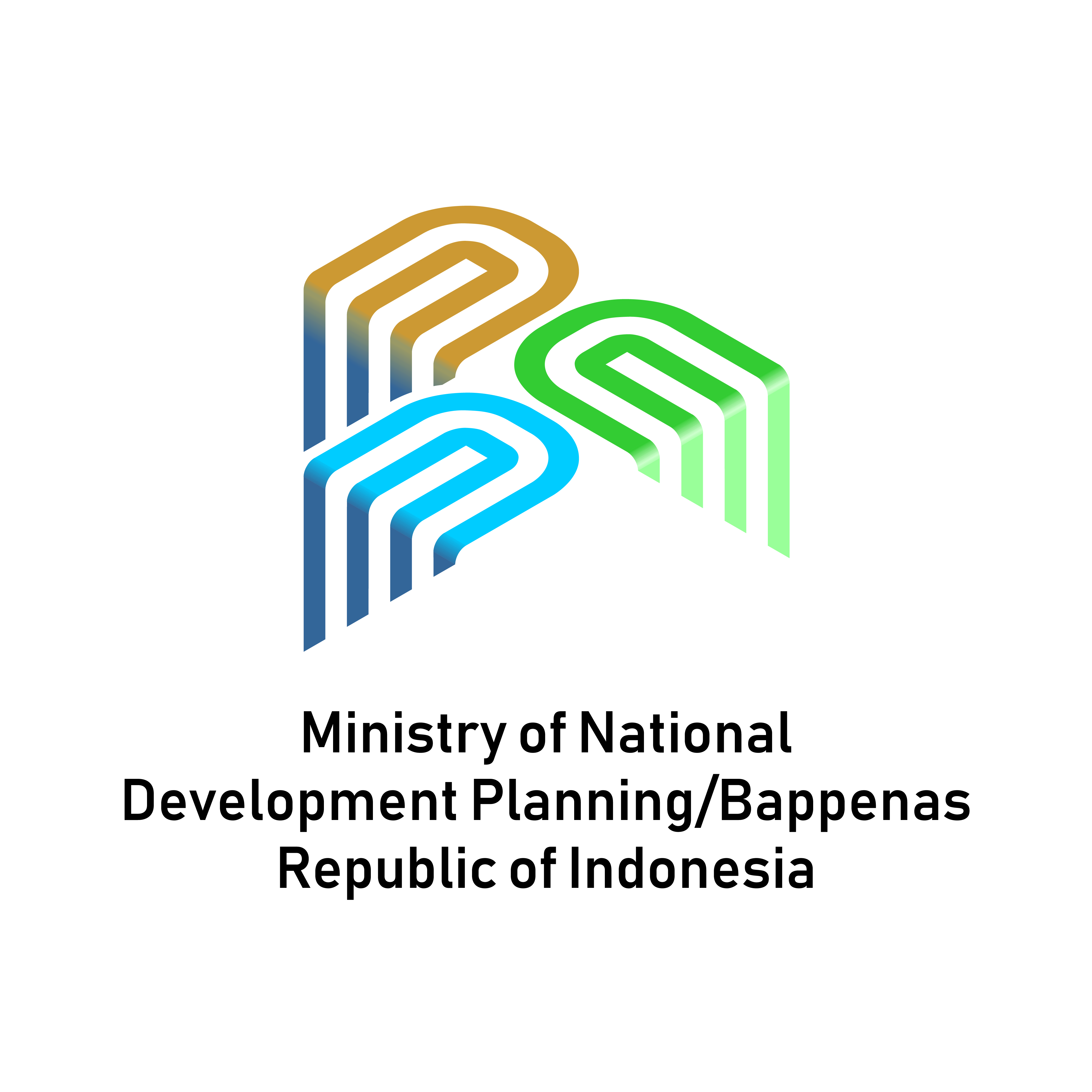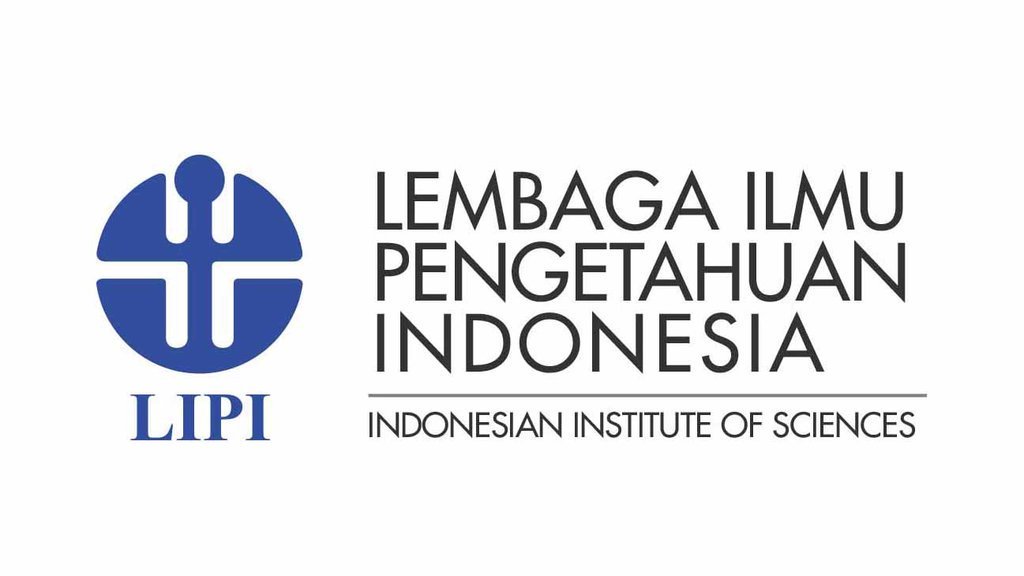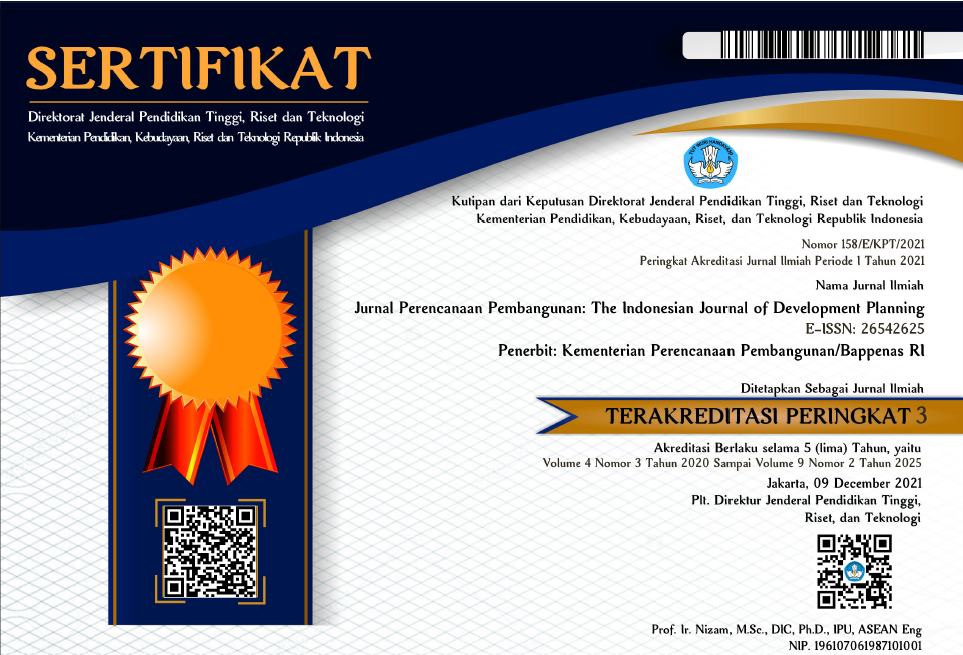The Financial Inclusion and Local Tax Revenue in Indonesia
DOI:
https://doi.org/10.36574/jpp.v7i1.308Keywords:
Financial Inclusion, Tax Revenue, Panel DataAbstract
This study calculates the financial inclusion index, which includes three dimensions: 1) banking penetration, 2) availability of financial services, and 3) usage of financial services in 33 provinces in Indonesia from 2011-2019. The study aims to find empirical evidence on whether financial inclusion affects local tax revenue using the Fixed Effects Panel Data Model. The results show that Indonesia's average regional financial inclusion index is still in a low category. The financial inclusion index has a positive and significant effect on local tax revenue. The results are robust for taxes from different sources, such as provincial tax revenue, regencies/cities tax revenue, or local tax revenue.
Downloads
References
Addison, T., & Levin, J. (2011). The determinants of tax revenue in Sub-Saharan Africa. Journal of International Development.
Ajide, F. M., & Bankefa, O. I. (n.d.). Does Financial System Influence Tax Revenue? The Case of Nigeria. African Journal of Economic Review, V(III).
Akçay, S., Sagbas, I., & Demirtas, G. (2016). Financial Development and Tax Revenue Nexus in Turkey. Journal of Economics and Development Studies. https://doi.org/10.15640/jeds.v4n1a10
Akram, N. (2016). Do Financial Sector Activities Affect Tax Revenue in Pakistan? The Lahore Journal of Economics. https://doi.org/10.35536/lje.2016.v21.i2.a6
Akyuwen, R., & Mangowal, C. (2016). Komparasi Peningkatan Inklusi Keuangan dan Indikator Pembangunan di Indonesia. Modus.
Azwar, A. A. (2017). Analisis Empiris Inklusifitas Keuangan Syariah di Indonesia. Jurnal BPPK : Badan Pendidikan Dan Pelatihan Keuangan. https://doi.org/10.48108/jurnalbppk.v10i1.21
Bakar, H. O., & Sulong, Z. (2018). The Role of Financial Sector on Economic Growth: Theoretical and Empirical Literature Reviews Analysis. Journal of Global Economics. https://doi.org/10.4172/2375-4389.1000309
Baklouti, N., & Boujelbene, Y. (2020). Shadow Economy, Corruption, and Economic Growth: An Empirical Analysis. Review of Black Political Economy. https://doi.org/10.1177/0034644619885349
Bhattarai, K. (2015). Financial Deepening and Economic Growth in Advanced and Emerging Economies. Review of Development Economics. https://doi.org/10.1111/rode.12133
Demirgüç-Kunt, A., & Klapper, L. (2013). Measuring financial inclusion: Explaining variation in the use of financial services across and within countries. Brookings Papers on Economic Activity. https://doi.org/10.1353/eca.2013.0002
Din, B. H. (2016). Estimating the determinants of the shadow economy in Malaysia. Geografia - Malaysian Journal of Society and Space, 12(5), 191–201.
Din, B. H., Habibullah, M. S., & Hamid, B. A. (2019). Re-estimation and modelling shadow economy in Malaysia: Does financial development mitigate shadow economy? International Journal of Business and Society, 20(3), 1062–1075.
Elsherif, N. E. (2018). Financial Inclusion, Shadow Economy and Financial Stability: Evidence from Emerging Economies. The American University in Cairo.
Fauzan, I. F., Firdaus, M., & Sahara, S. (2020). Regional financial inclusion and poverty: Evidence from Indonesia. Economic Journal of Emerging Markets, 12(1), 25–38. https://doi.org/10.20885/ejem.vol12.iss1.art3
Hsiao, C. (2005). Why Panel Data? Singapore Economic Review. https://doi.org/10.1142/S0217590805001937
Lotto, J. (2018). Examination of the status of financial inclusion and its determinants in Tanzania. Sustainability (Switzerland). https://doi.org/10.3390/su10082873
Maherali, A. (2017). Financial Inclusion, Digital Payments and Their Impact on Income and Tax Revenue Around the World. At Harvard University.
Mitchell, K., & Scott, R. H. (2019). Pesos or plastic?: Financial inclusion, taxation, and development in South America. In Pesos or Plastic?: Financial Inclusion, Taxation, and Development in South America. https://doi.org/10.1007/978-3-030-14876-8
Naceur, S. Ben, & Ghazouani, S. (2005). Stock Markets, Banks, and Economic Growth : Empirical evidence from the MENA Region.
Namira, B. (2019). Analisis Inklusi Keuangan Terhadap Kemiskinan dan Ketimpangan pada Negara-Negara Emerging Market.
Ningrum, D. K. (2018). Analisis Pengaruh Inklusi Keuangan terhadap Pertumbuhan Ekonomi, Kemiskinan, dan Ketimpangan di Jawa Timur Periode Tahun 2011- 2015. Jurnal Ilmiah Mahasiswa FEB.
Nkwede, F. (2015). Financial inclusion and economic growth in Africa: Insight from Nigeria. European Journal of Business and Management.
Nnyanzi, J. B., Bbale, J. M., & Sendi, R. (2018). Financial Development and Tax Revenue: How Catalytic Are Political Development and Corruption? International Journal of Economics and Finance. https://doi.org/10.5539/ijef.v10n8p92
Nofi Zumaidah, L., & Soelistyo, A. (2018). Pengaruh Total Aset, Dana Pihak Ketiga, dan Kredit Pada Bank Umum Terhadap Pertumbuhan Ekonomi Provinsi - Provinsi di Indonesia Pada Tahun 2013 - 2016. Jurnal Ilmi Ekonomi, 2(2), 251–263.
Oz-Yalaman, G. (2019). Financial inclusion and tax revenue. Central Bank Review. https://doi.org/10.1016/j.cbrev.2019.08.004
Putra, T. P., & Anis, A. (2020). Pengaruh Penduduk, PDRB Perkapita Dan Hotel Terhadap Penerimaan Pajak Daerah Kabupaten / Kota Di Sumatera Barat. Jurnal Ekonomi.
Sarma, M. (2008). Index of Financial Inclusion. In Indian Council for Research on International Economic Relations Working Paper No 215.
Sarma, M. (2012). Index of financial inclusion – A measure of financial sector inclusiveness. Berlin Working Papers on Money, Finance and Trade Development.
Siswa, I., & Agustin, G. (2020). Analisis Pengaruh Inklusi Keuangan terhadap Indeks Pembangunan Manusia di Indonesia Tahun 2015-2018. Jurnal Ilmiah Ekonomi Dan Bisnis, 17(2), 121–130.
Victory, D., & Hayati, B. (2020). Analisis pengaruh jumlah wisatawan, jumlah kamar terjual, pdrb perkapita, dan inflasi terhadap realisasi penerimaan pajak hotel kota semarang tahun 2010-2017. Diponegoro Journal of Economics.
Yorulmaz, R. (2013). Construction of a Regional Financial Inclusion Index in Turkey. Journal of BRSA Banking and Financial Markets.
Yuniar, G. N. (2018). Kinerja Pajak di Indonesia: Analisis Kapasitas Pajak dan Upaya Pajak Pusat (Studi pada 32 Provinsi di Indonesia Tahun 2012-2016).
Wooldridge, J. M. (2012). Introductory econometrics : a modern approach / Jeffrey M. Wooldridge. In Introductory econometrics : a modern approach.
Downloads
Published
How to Cite
Issue
Section
License
This is an open-access article distributed under the terms of the Creative Commons Attribution-NonCommercial-ShareAlike 4.0 International License. Copyright © Kementerian PPN/Bappenas RI


















